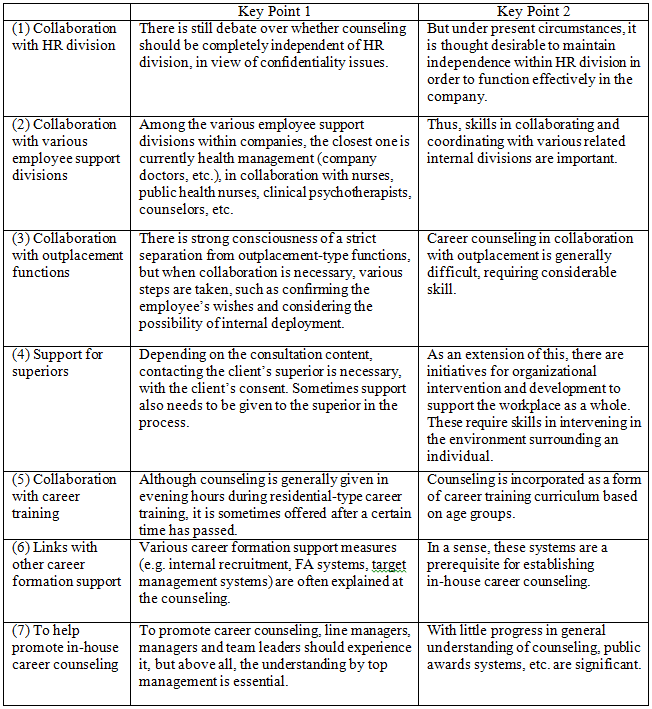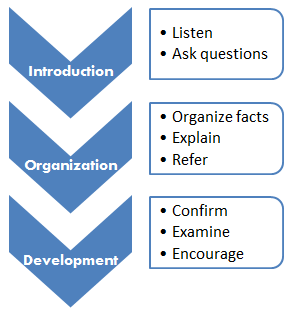JILPT Research Report No.171
In-house Career Counseling and its Characteristics in Japan:
Results of free description in the questionnaire survey and interview survey
May 20, 2015
Summary
Research Objective
The purpose of this Research, upon request of the Ministry of Health, Labour and Welfare, is to gather case examples of career counseling used in companies in Japan and to analyze and study the actual corporate career counseling practices as well as support systems for both individual employees and corporate organizations as a whole.
Research Method
In this Research we conducted a descriptive questionnaire survey and an interview survey (both in March to April 2014). In the descriptive questionnaire survey, we asked 43 career counselors to describe (1) an outline of companies etc. in which they mainly work as career counselors, (2) case examples that were effective for individual employees and (3) case examples that were effective for organizations. (4) Besides the above, we also gathered information on problems in promoting career counseling in companies, what is necessary or important in order to resolve the problems, and what should be done in policy terms. Respondents were asked to answer in at least 1,000 Japanese characters (equivalent to approximately 400 words of English) on each of these topics. In the interview survey, career counselors working for large corporations and those working freelance in companies were interviewed. A total of about 20 career counselors were asked about case examples in around 10 large corporations or their subsidiaries. Each interview lasted around an hour and a half. In addition to the questions similar to those asked in the descriptive questionnaire survey above, information on a wide range of themes was also gathered. These included the characteristics of in-house career counseling and how it is promoted in the companies where the respondents work, the skills demanded of career counselors working in-house, and collaboration with other departments and systems within companies.
Major Findings
- The surveys revealed that in-house career counseling is undergoing significant development in Japan, both in quantity (growing broader in scope) and in quality (enhancing contents). In particular it showed that knowhow on in-house career counseling has been accumulating over the last 20 years, making its roles and functions within an organization clearer. Specifically, the surveys highlighted certain characteristics that could be seen as peculiarly Japanese, broadly dividing into (a) the function of employee retention, (b) the function of adjusting relationships and promoting dialog, and (c) the function of giving significance and providing value.
- On the deployment and systems of in-house career counseling, employee services are currently provided in collaboration with human resources divisions and various other employee support divisions in many cases. Counseling is often provided in close collaboration with career training and other career formation support measures. Besides these, “adjustment of superior-subordinate relationships → organizational development” is also an important aspect of the work.
Figure 1. Systems and deployment of in-house career counseling

- The debate on how to respond to individual employees (clients) with in-house career counseling has also come into focus, to a certain extent. The consultation content generally consists of (a) changes in the work content accompanying transfers and promotions, (b) loss of motivation, (c) career enhancement, (d) problems faced by women workers on short hour or fixed-term contracts, (e) career problems related to mental health, and (f) others. The processes involved in the counseling itself consist of (a) an introductory stage (listening, asking questions), (b) an organization stage (organizing facts, explaining, referring), and (c) a development stage (confirming, examining, encouraging).
Figure 2. Processes of in-house career counseling

- The effect of in-house career counseling on “organizational development” generally proceeds from building informal relationships within individual workplaces to organizational adaptation and establishment, adjustment of superior-subordinate relationships, and provision of information to top management. When career counseling is first introduced, only individual interviews are provided, but necessity of improving relationships with superiors becomes recognized in order to support individuals. An impact of workplaces and the organization as a whole is also seen. As a result, the targets of support and intervention are gradually shifted to more senior levels toward the center of the organization from the stage of introduction.
Policy Implications
- Although in-house career counseling is sometimes expected to have an outplacement-type function, it is currently functioning more as a measure for retaining employees, against the background of Japan’s peculiar employment practices. From the perspective of promoting labor mobility, however, it is often useful for accepting and establishing workers who join a company in mid-career, for the same reason, representing its characteristics in providing a counseling service inside companies.
- From the outset, there was a strong sense of adjusting superior-subordinate relationships at the root of problem concern over career counseling in Japan. Even now, amid diversifying workplace environments and employee composition, adjusting relationships and promoting dialog in the workplace are important tasks. In the future, we should consider providing some kind of support to help managers acquire mindsets, knowledge and skills in career formation support as an important issue.
- In-house career counseling has produced better effects when introduced in combination with related internal systems (counseling rooms for other purposes, career training, and other measures to support career formation) rather than functioning independently. We should develop measures to promote and spread awareness of in-house career counseling in connection with other internal measures further than before. In particular, in-house career counseling can function as a catalyst to increase the effects of internal human resources and personnel management measures as well as vocational/career development measures. Combined deployment with career training is thought to be particularly effective, and when applied in conjunction with promotion of mental health and labor mobility, it could be seen even more as a measure for supporting internal vocational ability development and education/training.
- As the effects of in-house career counseling when introduced independently, the abstract “function of giving significance and providing value” and “organizational development” are apparently important. On the one hand, therefore, more attention than before should be given to enhancing the expertise and skill of in-house career counselors who can respond to more abstract contents. On the other hand, “organizational development” should also be considered as an important competency for in-house career counselors in the future.
Policy Contribution
This Research is expected to contribute mainly to career counseling measures but also broadly to policies for supporting career formation and developing vocational skills. Part of the Research has already been used as a reference material by the “Career Consulting Research Group” organized by the Career Formation Support Office of the Ministry of Health, Labour and Welfare, amongst others.
Contents (available only in Japanese)
- JILPT Research Report No.171 / Whole text (PDF:2.5MB)
If it takes too long to download the whole text, please access each file separately.
- Cover – Preface – Authors – Contents (PDF:833KB)
- Chapter 1 Objective and Method of this Research and Composition of Chapters (PDF:1.3KB)
- Chapter 2 Characteristics of In-house Career Counseling in Japan (PDF:803MB)
- Chapter 3 Systems and Deployment of In-house Career Counseling (PDF:784KB)
- Chapter 4 In-house Career Counseling and Individual Career Development (PDF:790KB)
- Chapter 5 In-house Career Counseling and Organizational Development (PDF:784KB)
- Descriptive Survey Text Data
Interview Survey Text Data (PDF:1.3MB)
Research Category
Project Research: “Survey Research on Lifelong Career Formation Support and Employment Promotion”
Subtheme: “Survey Research on Lifelong Career Formation Support”
Research Period
February 2013 – FY2014
Authors
- Hideo SHIMOMURA
- Senior Researcher, The Japan Institute for Labour Policy and Training
- Hiroshi TAKAHASHI
- Lecturer at Youth Career Research Institute and Hosei University
Category
Career guidance / Job information, Human resources management / Vocational skills development
JILPT Research Report at a Glance
| To view PDF files, you will need Adobe Acrobat Reader Software installed on your computer.The Adobe Acrobat Reader can be downloaded from this banner. |

